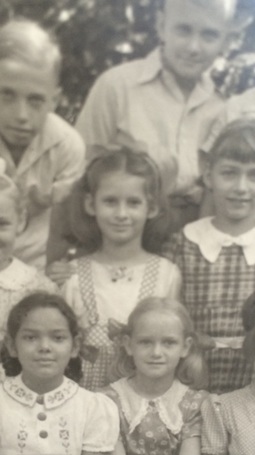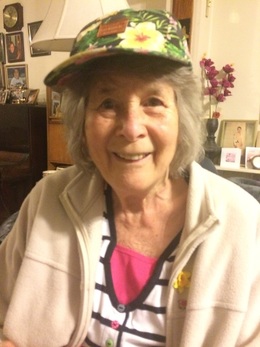Hanalei Souza
A Woman proudly owning her place in the kitchen.
The Face behind the kitchen humor page, @Ladylinecook
The Face behind the kitchen humor page, @Ladylinecook
 Having all your grandparents, aunts, uncles, and cousins half way across the world makes a different kind of family dynamic for a child. Thanksgiving dinners were often just my parents and brother and I — not just because of the geographical distance, but also the fact that British people don’t celebrate Thanksgiving. Although I saw my grandparents about once a year at most, and less often as flight ticket prices went up, they were still able to leave an impression. As I have grown older, I have learned some of the very interesting, and quite frankly, very cool and badass history. We seem to live in a society where old people are thought less of than they used to — that they aren’t “cool” or “hip” enough for the new generation. My Father’s mother, whom my brother and I have always called “Oms” or “Omi” was born in Java, Indonesia, and is of Dutch descent. She attended her first years of school there in Indonesia, which was actually the same school president Barack Obama went to. At the age of nine, in 1939, WWII broke out and the Japanese took over, putting everyone in prisoner of war camps. Between the ages of 9 and 14, she was in one of those camps, and many of her friends died from disease or conditions, or were raped. In 1945, just days before all the prisoners were about to be killed, the British navy came in and saved them. “I’ll never forget the sound of their bagpipes,” she said, “It was the most beautiful sound because we knew life would finally be normal again.” After the war, my grandmother was sent to boarding school in England when her parents went back to Indonesia, and after that went to a farm in Cornwall, England. She had to learn English as a second language in a short amount of time. She then worked as a nurse, and then as a flight attendant, since back in that time, flight attendants had to meet that requirement. She met my grandfather, who also worked in the airline industry, and they were married and had three children, with my father as the middle child. I remember she would tell funny stories of my aunt, uncle, and father, such as when my uncle swallowed a coin, or when the detached head of one of my aunt’s dolls ended up in the apple basket, giving her a right old scare. Whenever we go back to England, we stay at her home in Crawley, a small town about an hour drive south of London. It is the same house my father and his siblings were born and raised in. That town feels like home even though I never lived there. On street corners, there are those classic red phone booths and red mailboxes you see in movies. There is a park my brother and I would always walk to and play on the flying fox – a seat attached to a rope that slid down a cable about 100 feet long. That kind of unregulated park feature would never exist in the U.S. — too many lawsuits. Almost every memory I have with my grandmother is positive. With the advent of Facetime video calls, I was able to see her almost every day when my dad would talk to her. Last time I went to Europe, when I was eighteen and my brother fifteen, was one of the most memorable. We went to Holland and she was able to meet up with some of her high school friends, and we saw some of the places she grew up in, as she visited Holland for a few months a year before and after the war. For some reason, my brother and I decided we would act like turtles around her, and she became the queen of our turtle society. To this day, she is still “Queen Turtle”, and we act like a turtle whenever we see her. I remember she would care about the things my brother and I cared about, such as out favorite TV show, Futurama. She would send me articles about snowboarding in the mail, and would hand-craft the most beautiful, personalized cards for birthdays, Christmases, and my parents’ anniversaries. I remember I even found a snowboarding magazine at her house, although she didn’t seem to know how it got there. It was not until recently that I learned more about her past with the war camps. The prisoners were scared all the time because uncertainty loomed over their every day like the clouds that loom over England. The prisoners didn’t even have the luxury of knowing that they will see the next day. What amazes me is her ability to be still so light-hearted and able to pour into my life as a young girl. It’s almost as if she made sure I had a smooth time going through my formative age — the same ages she spent in war camp.  It took her a long time to forgive the Japanese for what they had done. They had robbed her of her childhood and killed her friends, even though she had done them no wrong. One time, she and her father watched a Japanese man be forced to shovel dirt from one side of a road to the other, shovel by shovel, only to have to do it all over again for humiliation. Her father thought it would be right for her to jeer at the man. After all, the Japanese had put them to work like that for years and she had every right to jeer. She couldn’t bring herself to do it. It was only upon reading the book about the Hiroshima bombings that she realized how much pain the Japanese had gone through in the war as well. “I hope you never have to live through a big war like that,” she says. That’s thing with war – it sucks for everyone. She learned not to take freedom for granted after the war. People don’t often think of the fact that they usually have control over their day-to-day life. She shut out her experience in war camp for many years, as in those days there weren’t many options for counseling. That’s what people did back then — they just had to “suck it up”. Although this was a grim time of her life, she is still able to make light of some of the things that happened, such as when one of the Japanese guard’s shoes came off and was grabbed by a dog, or how they would peek out the windows and giggle at the soldiers standing to attention over and over again whenever the captain walked by. I am fortunate and grateful to have a good relationship with my grandparents. Through my grandma’s story, I have realized that there are a lot of things that can be taken for granted, such as daily freedoms and, you know, being pretty sure you’re not going to die the next day or not. I have learned that positive, light-hearted people can still have backstories that aren’t so positive, and I have learned that old people can be cool if the people of my generation would learn to take the time to find out their stories.
1 Comment
2/28/2018 01:14:05 am
There are only few people that are not willing to panic in this kind of situation but if we are looking at the majority. Than it seems to be a normal reaction that majority has been giving all the time.
Reply
Leave a Reply. |
Details
Categories
All
Instagram
|